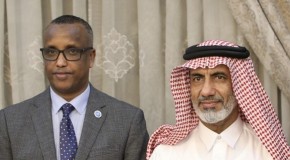Souce:Xinhua
Fear engulfed worshippers in Kenya’s capital Nairobi after an explosive device blasted inside a Sunday school at an Anglican church near Eastleigh on the east of the city.
The explosion at St Polycarp church killed at least one child and injured 12 others, six critically. The terror attack is the first one targeting mainly children at a church in Kenya.
Majority of churches around the capital had services in progress when the blast occurred shortly after 10: 30 a.m on Sunday.
Regional police commander Moses Ombati said so far the police have not arrested any suspect but are following crucial intelligence information that may lead them to make some arrests.
“So far we have not made any arrests in connection to the grenade attack at the church which targeted the children in a Sunday school. In total the victims were 13, one died on the spot, 6 were treated and discharged while 6 are still undergoing treatment,” Ombati told Xinhua on Sunday.
He vowed to thorough crackdown in the coming days that will see Al-Shabaab sympathizes still operating in the East African get arrested and arraigned in court.
“We will not allow some elements of Al-Shabaab in this country. We are zeroing in on crucial information that will see them wiped out completely. Wait and see,” the regional police commander said.
Ombati said security in key towns in Kenya has been put on a high alert following Kenya’s military operations in Somalia which sparked threats from the Al-Shabaab group that it will retaliate deep in Kenya.
News of the incident in Eastleigh, locally known as the ‘small Mogadishu’ which its largely inhabited by Kenyans of Somali origin, spread in churches as authorities intensified security in a bid to thwart terror attacks.
Some pastors announced the heinous act to faithful during sermons while others in attempts to stem panic kept mum, but ensured security was intensified.
“My brother called and informed me that terrorists had struck at St Polycarp church along Juja road and asked me whether we were safe in church,” narrated Phyllis Atieno on Sunday afternoon.
Atieno, who lives and attends church in Kariobangi, about six km from the blast scene, said she passed the message to two of her friends and an usher.
“The usher already knew about the incident. He told me the pastor also knew and would inform the church. The pastor later announced to the church asking people not to panic and assuring them that security had been intensified,” she narrated.
Despite the assurance, Atieno said she left the church building with her two friends but stayed inside the compound to monitor the situation.
“We became fearful. There was no way we could continue with the service inside the church, which was crammed with tens of people yet we knew that a terror attack had occurred few kilometres away, ” she said.
Atieno was accompanied by her brother’s two children and they were at a Sunday school in the church compound. She said she withdrew them from the session.
“The Sunday school is located few metres from the church. Children usually go there to learn Christian teachings as adults attend the main worship service,” she said.
Atieno recounted it is her brother who instructed her to withdraw the children from the Sunday school.
“But I realised it was not only me among the faithful who was concerned with the safety of children. Other parents also came for their children as they feared for their security,” she said.
In most churches in Kenya, service at Sunday schools, which are usually located away from the main church, take place concurrently with the adults’ worship session.
Some churches divide Sunday school classes depending on ages. However, majority lump the children into a single room manned by one or two teachers.
Lillian Norima, who attends church in the central business district, said their pastor at Light Christian Centre announced details of the blast to faithful during service.
“He then led the faithful in praying for victims of the blast as he condemned the act of terrorism,” she narrated. However, while the pastor continued with the service, it was evident that there was panic among worshippers.
“People were alert. In the about 40 minutes that we stayed in the church, worshippers were keen on who was getting in and out of the church. They would follow any movement in the church keenly,” she noted.
Security was tightened in the church and its compound, which was full of worshippers, some waiting to get into the next service.
Most pastors in the capital called for religious tolerance and asked the police to stem rising attacks against Christians and churches in the East African nation.
Suspected Al-Shabaab sympathisers have stepped up attacks on churches in and outside the capital since Kenya Defence Forces crossed into Somalia to fight the rag-tag army about a year ago.
The latest attack is among a dozen others that have happened in the previous months mainly in Nairobi, Mombasa and Garissa town in Northern Kenya.
Terror attacks on churches in the East African nation have increased since March when suspected Al-Shabaab sympathisers hurled explosives at a Christian prayer meeting taking place at a bus terminus in Mombasa.
Police have particularly warned against the laxity in the screening of cars for explosives at all shopping malls and any business or social gatherings with at least 10 people at any given moment that these might be vulnerable to attacks.
Kenya’s tourism has suffered a decline the number of tourists arriving since September 2011 when the Somali militant group, the Al-Shabaab, carried out the kidnappings of tourists in the Lamu archipelago and the kidnapping of the Spanish volunteers.
The port city, the capital Nairobi and other parts of Kenya have suffered a series of grenade attacks since Kenya sent troops into Somalia last year to try to pursue Al-Shabaab insurgents it blames for a surge in violence and kidnappings threatening tourism.
At least two people died and over 25 others were injured in the explosion and another that occurred at a bar in the town on the same day.
In another incident at House of God Miracle Church on the outskirts of Nairobi’s central business district some weeks later, one worshipper died and 16 others were injured, 5 critically, after a terrorist threw a grenade inside the church as the pastor was concluding the service.
There have been fears that the attacks targeting churches, which have become terrorists’ favourite spots, may spark religious animosity between Christians and Muslims in the East African nation.
However, political and religious leaders have worked hard to spread peace messages and call for unity between people of various faiths.



















Comments are closed.